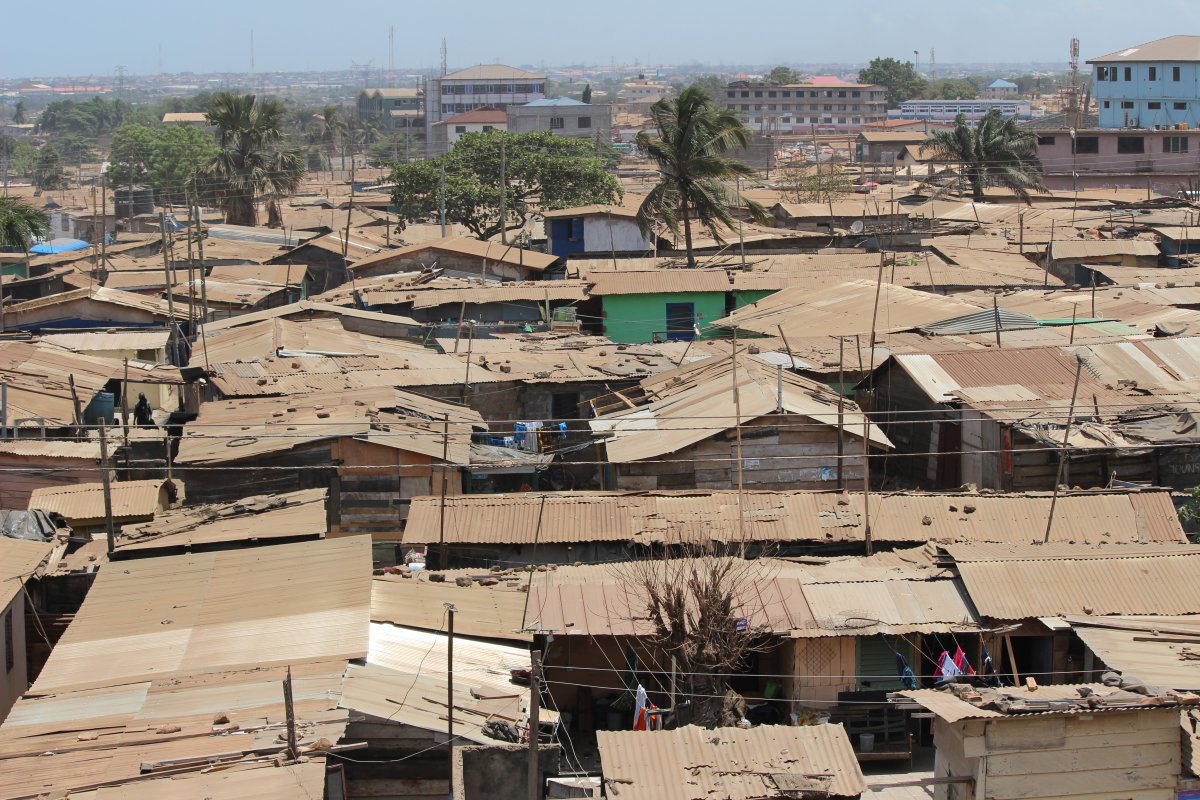Ashley Terry is a senior producer with globalnews.ca. In the spring of 2013, she served as an expert trainer with Journalists for Human Rights in Ghana as part of the Shaw Africa Project.

ACCRA, Ghana – The Amui Dzor housing project towers over the rest of the Ashaiman slum.
The three-storey building houses 31 families, who each pay 75 Ghana cedis (CDN$38) a month for a room.
They have access to bathrooms, showers and kitchens. It is a vastly different lifestyle than those living in the surrounding neighbourhood.
The other slum dwellers of Amui Dzor, near Tema in Greater Accra, live in makeshift wooden homes with no bathrooms or water.
“Looking at the situation, people live in wooden structures, and we thought it has a lot of challenges, drainage issues, fire…” said Halid Alhassan, who manages the commercial toilet attached to the housing project.
In light of these issues, the community agreed to the creation of the housing project in 2009, in collaboration with the Ghana Federation of the Urban Poor and the People’s Dialogue on Human Settlement.
- Trudeau says ‘good luck’ to Saskatchewan premier in carbon price spat
- Canadians more likely to eat food past best-before date. What are the risks?
- Hundreds mourn 16-year-old Halifax homicide victim: ‘The youth are feeling it’
- On the ‘frontline’: Toronto-area residents hiring security firms to fight auto theft
The Amui Dzor housing project. (Ashley Terry, Global News)
The housing project is a bright spot surrounded by a bleak slum: children play in piles of garbage on the edge of the neighbourhood. Malaria and cholera are rampant. Residents burn their garbage because they can’t pay to have it collected.
Akarim cites sanitation as one of the major issues. He said people can’t afford to have their trash collected, and that people end up burning it.
Yakubu Akarim. (Ashley Terry, Global News)
When asked whether others would want to move out of the slum as he did, Akarim said, “People don’t want to leave, they need the government to give them their 50×50.”
The “50×50” is a reference to land demarcation, or property ownership by people in the slum. “Then they can develop however they want,” he said.
Calls to the Accra Municipal Assembly (AMA) for comment on this story went unanswered at the time of publication, but demarcation of land is being considered by the AMA.
One roadblock is that the land is still owned by the Tema traditional council and the Tema Development Corporation (TDC).
The street outside Akarim’s shop in Amui Dzor. (Ashley Terry, Global News)
The AMA has formed a development committee to consider a plan for land demarcation, but wresting control from the current owners has proven difficult.
Tensions between the people of Ashaiman and the TDC go back to 2005, when government and the TDC threatened residents to vacate unauthorized homes or they would be destroyed.
In December 2012, Ashaiman residents threatened to boycott the election if land was not released.
Land ownership remains elusive for the people of the slum, making housing projects like the one in Amui Dzor a viable alternative.
But the housing project is not without its own issues.
“The toilet facilities are not enough,” said project resident Abiba Abdullah, through a translator.
She said that in the mornings, the lineup for the toilets is so long that people end up defecating on themselves or are forced to go outside.
Abiba Abdullah outside the commercial toilets in the Amui Dzor housing project. (Ashley Terry, Global News)
The open toilets attract mosquitos, leading to the spread of malaria. Abduallah herself is just getting over her latest bout of the illness.
Another issue, according to Salifu Abdul-Mujeeb of the People’s Dialogue, is mistrust. “People always think you want to take their money,” he said.
Mujeeb said the people of Ashaiman and other slums in Accra are reluctant to move in to project housing that they must pay for, when they live in makeshift slum housing for free.
“People prefer to live in a small room, without water, but at peace,” said his colleague Farouk Braimah.
The original plan for the housing project was much larger, but land negotiation with the Tema chief and the TDC has stalled.
Mujeeb is still optimistic. “There will be a right time for the project to go on,” he said.








Comments